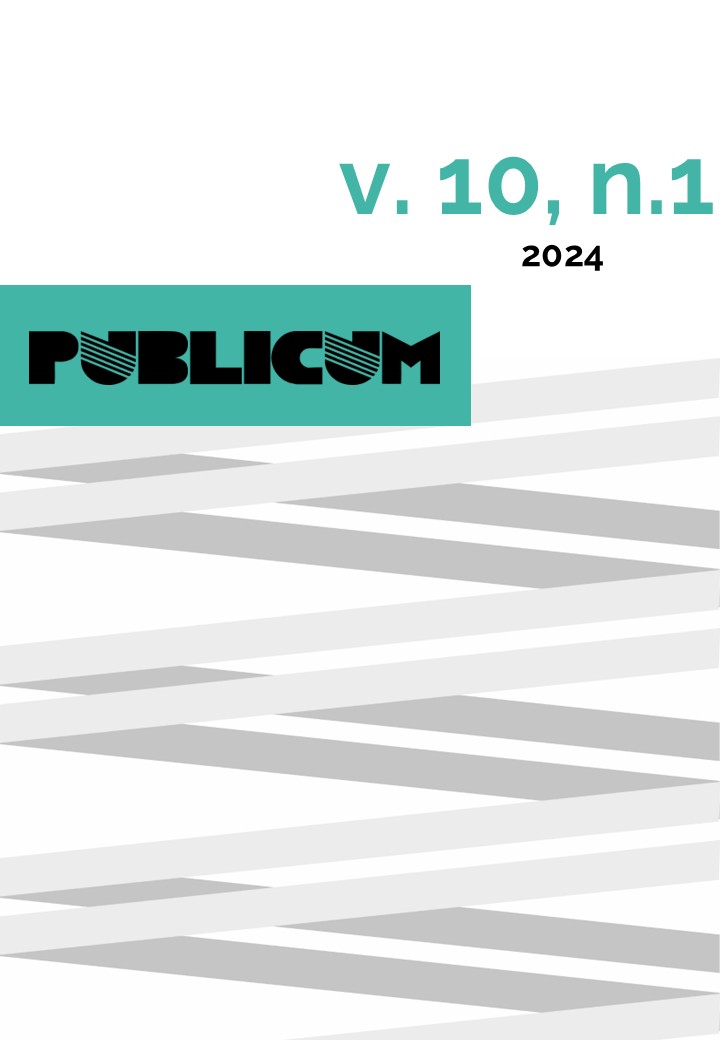A compliance for Brazil’s E-Democracy
DOI:
https://doi.org/10.12957/publicum.2024.81940Keywords:
democracy, compliance, controls, parity, TechnologyAbstract
Technology has brought impacts to all areas of Law, being considered a great advance in post-modernity, worthy of a careful look from its operators. In this context, compliance emerged; terminology used in companies to determine good practices to be applied by the legal entity and its employees, who must act in accordance with policies, rules, internal and external controls, including using digital resources to facilitate day-to-day life and achieve the expected results. The objective of this work is to verify the possible implementation of compliance for political parties, in order to combine this technology with democracy, bringing compliance to the electoral process, thus avoiding bad candidates. The research explored the doctrine, in order to substantiate the arguments espoused, to reach the conclusion that the use of these practices, related to politics, would bring benefits to Brazilian citizens, who would be faced with greater electoral parity.
References
ALLEBRANDT, Sérgio Luís; AGOSTINI, Cintia. A democracia participativa e deliberativa e sua importância para qualificar o processo de planejamento do desenvolvimento regional. In: FELIPPI, Ângela Cristina Trevisan et al. Observando o planejamento regional no Rio Grande do Sul: uma análise da experiência recente dos Conselhos Regionais de Desenvolvimento (COREDEs). Santa Cruz do Sul: UNISC, 2015, pp. 35-48.
BARRETO NETO, José Maurício Linhares. NEVES, Fernando Henrique Cardoso. Compliance Eleitoral (?) para partidos – conformidade para a Democracia? Revista Justiça Eleitoral em Debate, v. 10, n. 1, 2020.
BOBBIO. Norberto. O futuro da democracia. Uma defesa das regras do jogo. 17. ed. Rio de Janeiro/São Paulo: Paz&Terra, 2020.
BONAVIDES, Paulo. Teoria geral do estado. 8. ed. São Paulo. Malheiros, 2010.
COLEMAN, S.; BLUMLER, J. The internet and democratic citizenship: theory, practice and policy. Cambridge: Cambridge University Press, 2009.
GOMES, Wilson. A democracia digital e o problema da participação civil na decisão política. Revista Fronteiras: Estudos Midiáticos, v. VII, n. 3, p. 214-222, set./dez. 2005.
HARBEMAS, Jürgen. Três modelos normativos de democracia. Lua Nova. São Paulo, nº 36, p. 39-53,1995.
JUNQUEIRA, Caio. Críticas ao governo em redes derrubaram a nomeação de Luana Araújo. CNN Brasil, jun. 2021. Disponível em: https://www.cnnbrasil.com.br/politica/2021/06/07/criticas-ao-governo-em-redes-derrubaram-a-nomeacao-de-luana-araujo. Acesso em: 08 nove. 2021.
LANDES, David. Prometeu desacorrentado: Transformação tecnológica e desenvolvimento industrial na Europa ocidental, de 1750 até os dias de hoje. Rio de Janeiro, Elsevier, 2005.
LUSOLI, Wainer. Voice and equality: the state of electronic democracy in britain. Nova York: Hampton Press, 2013.
MELO, Alexandre. Nove das dez hashtags mais usadas no Twitter são sobre eleição. Valor Econômico, São Paulo, out. 2018. Disponível em: https://webcache.googleusercontent.com/search?q=cache:Cv7L5k5fHekJ:https://valor.globo.com/politica/noticia/2018/10/28/nove-das-dez-hashtags-mais-usadas-no-twitter-sao-sobre-eleicao.ghtml+&cd=2&hl=pt-BR&ct=clnk&gl=br. Acesso em: 23 dez. 2021.
NOBRE, M.; COELHO, V. S. Participação e deliberação: teoria democrática e experiências institucionais no Brasil contemporâneo. São Paulo: Editora 34, 2004.
OLIVEIRA, Nythamar. Informação e democracia: a reflexão contemporânea da Ética e da Política. Tecnologia, juridificação, democracia: crítica do poder em Foucault e Habermas. Brasília: Instituto Brasileiro de Informação e Tecnologia, 2010.
RAMOS JÚNIOR, Galdino Luiz; DIAS, Jefferson Aparecido. Samba de Enredo e Democracia. Rio de Janeiro: Lumen Juris, 2020.
REALE, Miguel. Teoria tridimensional do direito. 5. ed. São Paulo: Saraiva, 2003.
SADI, Andréia. Ministro do STF suspende nomeação de Alexandre Ramagem para diretor-geral da PF. G1, abr. 2020. Disponível em: https://g1.globo.com/politica/blog/andreia-sadi/post/2020/04/29/ministro-do-stf-suspende-nomeacao-de-alexandre-ramagem-para-a-diretoria-geral-da-pf.ghtml. Acesso em: 18 maio 2020.
SANTOS, Boaventura de Souza (org.). Democratizar a democracia: os caminhos da democracia participativa. Rio de janeiro: civilização brasileira, 2002.
SARMENTO, Daniel. Direitos, Democracia e República. Escritos de Direito Constitucional. Belo Horizonte: Fórum, 2018.
SILVA, Sivaldo Pereira da; SAMPAIO, Rafael Cardoso; BRAGATTO, Rachel Callai. Concepções, debates e desafios da democracia digital. In: SILVA, Sivaldo Pereira da; SAMPAIO, Rafael Cardoso; BRAGATTO, Rachel Callai. (Orgs.). Democracia digital, comunicação política e redes: teoria e prática. Rio de Janeiro: Folio Digital; Letra e Imagem, 2016.
Downloads
Published
How to Cite
Issue
Section
License
Copyright (c) 2025 Emerson Ademir Borges de Oliveira, Leandro Cezar Rey Leitão de Figueiredo, Catharina Martinez Heinrich Ferrer

This work is licensed under a Creative Commons Attribution-NonCommercial 4.0 International License.
The author(s) of the paper declare(s) to know and agree to the following rules:
1) The author(s) undertook the work presented to the journal, being entirely responsible for the ideas and concepts therein transmitted, which do not necessarily correspond to the point of view of Publicum’s Editors.
2) The ethical principles alluded to in the evaluation policy of the journal [RDN1] were met in the conduction of the work presented to submission.
3) The author(s) assume(s) authorship and responsibility for their work, declaring that it does not infringe any third party intellectual property rights.
4) The author(s) take(s) full responsibility for moral or patrimonial damages that the distribution of the work may generate to third parties.
5) The author(s) grant(s) the journal the rights to reproduce, edit and first publish the paper in any media – in particular in digital form – in an electronic archive on the Internet.
6) The author(s) confer(s) the right to the editors to modify the text submitted, without prejudice of its contents, when necessary to standardize the presentation of the works and to meet the norms of the journals’ own edition.
7) The author(s) agree(s) to the final form of the paper approved by the journal.
8) The author(s) authorize(s) the disclosure of the paper in the channels of communication of the Faculty of Law of UERJ.
9) The author(s) agree(s) with the reproduction of short extracts from the paper in other UERJ publications.
10) The author(s) recognize(s) that, through the abovementioned assignment and authorizations, he/she/they will not receive payment under any modality, meaning these will have the nature of scientific collaboration.
11) The author(s) is(are) aware that publication of the work may be refused if it is not considered appropriate, for any reason, whatsoever, and such refusal does not create responsibility and/or burdens of any kind to the journal or UERJ.
[RDN1]Ver COPE.

Publicum está licenciado com uma Licença Creative Commons Atribuição-NãoComercial 4.0 Internacional.

